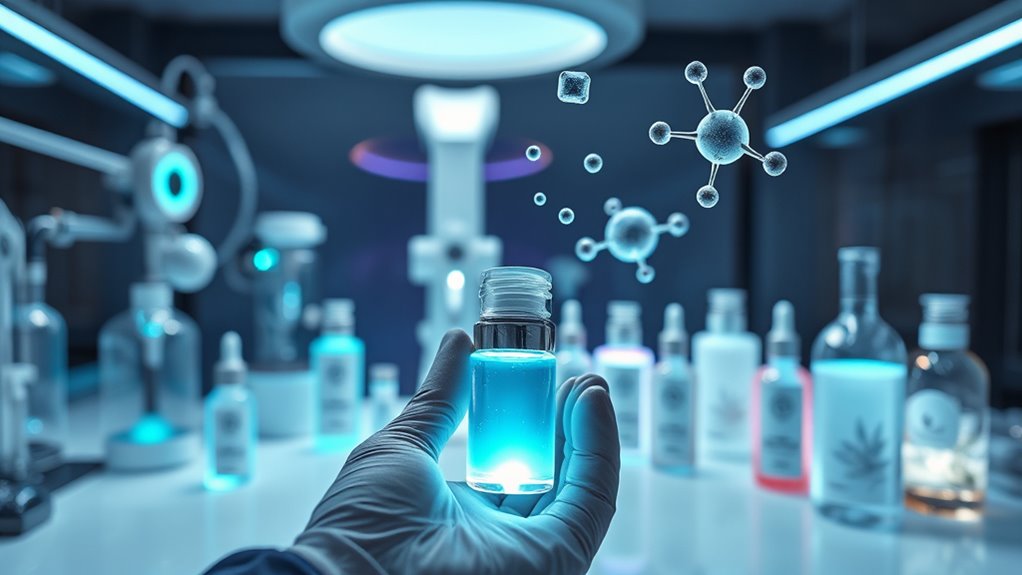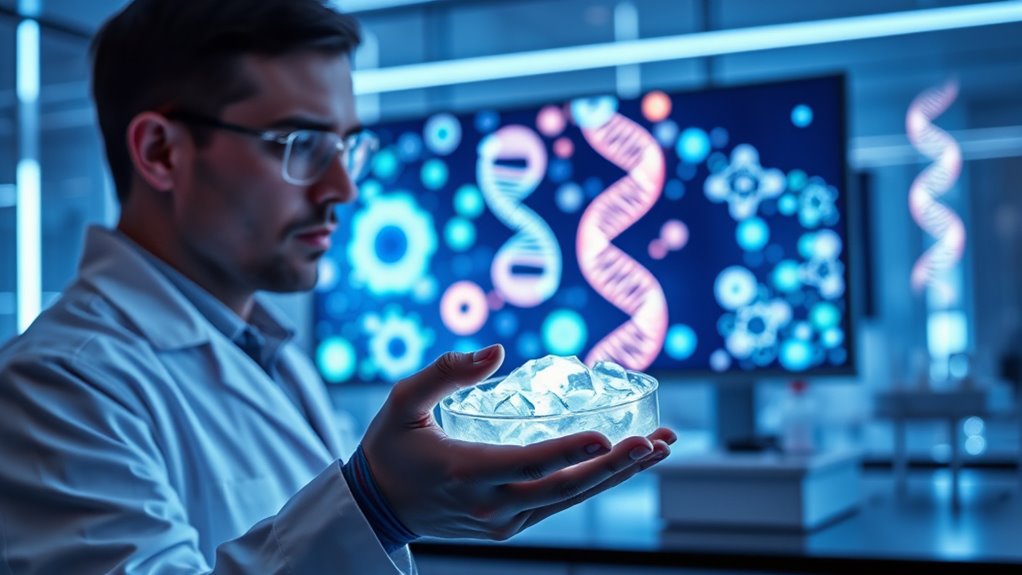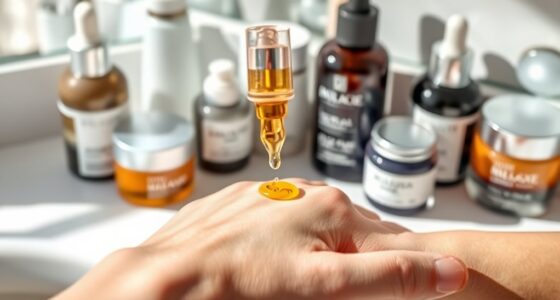Biotech skincare is blending science with natural ingredients to create more effective, personalized, and sustainable products. By harnessing synthetic biology and microbiome therapy, you can benefit from ingredients engineered for your skin’s unique needs. This innovation reduces reliance on traditional chemicals and promotes healthier skin. As technology advances, products become safer, more transparent, and tailored to your lifestyle. Keep exploring to discover how biotech is truly revolutionizing your skincare experience.
Key Takeaways
- Biotech skincare combines advanced science like synthetic biology and microbiome therapy to create personalized, effective, and sustainable products.
- Engineered microorganisms produce active ingredients, reducing reliance on traditional plant extracts and synthetic chemicals.
- Microbiome-focused products restore skin’s natural balance, improving barrier function and reducing inflammation for healthier skin.
- Personalization uses scientific data to tailor skincare routines, delivering rapid results with minimal irritation.
- Emphasis on safety, transparency, and innovation drives the development of lab-grown ingredients and futuristic delivery technologies.

In recent years, biotech skincare has revolutionized the beauty industry by merging cutting-edge science with natural ingredients. This innovative approach taps into advances like synthetic biology and microbiome therapy to create products that are more effective, personalized, and sustainable. Synthetic biology allows scientists to engineer microorganisms or other biological systems to produce active ingredients tailored for skincare. Instead of relying solely on plant extracts or synthetic chemicals, you now have formulations crafted from lab-designed microbes that generate powerful antioxidants, peptides, or other beneficial compounds. These bioengineered ingredients can be more consistent, potent, and environmentally friendly, giving you skincare that’s both innovative and eco-conscious.
Microbiome therapy is another breakthrough shaping the future of biotech skincare. Your skin hosts a complex community of microorganisms—bacteria, fungi, and viruses—that play a vital role in maintaining skin health. When this microbiome is imbalanced, issues like acne, eczema, or sensitivity can arise. Microbiome therapy focuses on restoring and supporting this natural ecosystem through probiotics, prebiotics, or live cultures embedded in skincare products. By nurturing your skin’s microbiome, you can enhance its barrier function, reduce inflammation, and promote a healthier, more resilient complexion. These therapies are personalized, targeting your specific skin needs and helping to prevent problems before they develop.
The integration of synthetic biology and microbiome therapy also means that biotech skincare is moving away from one-size-fits-all solutions. Instead, products are being designed with precision to suit your unique skin profile. You might find formulations that adapt to your environment, lifestyle, or genetic makeup, offering a level of customization previously unavailable. This scientific approach aims to deliver rapid results while minimizing the risk of irritation or adverse effects, which are common with traditional skincare products. It’s a shift toward smarter, more sustainable beauty routines that prioritize your skin’s health long-term.
Furthermore, biotech skincare companies are increasingly committed to transparency and safety. Scientific validation backs the claims of these products, and rigorous testing ensures they’re safe for everyday use. As these technologies evolve, you’ll likely see even more breakthroughs, such as lab-grown ingredients that reduce reliance on harvesting natural resources or microbiomes tailored specifically to your skin’s needs. This convergence of science and beauty isn’t just about addressing skin concerns—it’s about revolutionizing how you care for your skin, making your routine more effective, personalized, and aligned with environmental sustainability. Additionally, advancements in projector technology have shown how precision and innovation can significantly impact product development and formulation processes.
Frequently Asked Questions
How Safe Are Biotech Skincare Products for Sensitive Skin?
Biotech skincare products are generally safe for sensitive skin, as biotech innovation allows for precise ingredient development, reducing irritation risks. These products often prioritize skincare sustainability, using eco-friendly methods that minimize harsh chemicals. However, always patch-test new products and consult a dermatologist if you have concerns. With careful selection, biotech skincare can be a gentle, effective option that aligns with your skin’s needs and supports sustainable beauty practices.
Can Biotech Ingredients Cause Allergic Reactions?
Think of biotech ingredients as delicate dancers on a stage; sometimes they hit a false step. Yes, they can cause allergic reactions, especially if their allergenic potential is high or if the ingredient stability is compromised. Always check for known allergens and consult with a dermatologist if you have sensitive skin. Staying informed helps you avoid unwanted reactions and enjoy the benefits biotech skincare offers safely.
Are Biotech Skincare Products Suitable for All Age Groups?
Biotech skincare products can be suitable for most age groups, but you should consider age appropriateness and skin type compatibility. Younger skin may need gentler formulations, while older skin could benefit from targeted anti-aging ingredients. Always check product labels and consult a dermatologist if you’re unsure. By choosing products tailored to your age and skin type, you can enjoy the benefits of biotech skincare safely and effectively.
How Long Does It Take to See Visible Results?
You’ll likely see visible results within 4 to 8 weeks, but this varies based on ingredient concentration and individual skin type. Clinical trials show that potent biotech ingredients, like peptides and growth factors, often need this time to show noticeable improvements. Be patient, as consistent use enhances effectiveness. Keep in mind, skin responds differently, so some may see quicker results, while others require more time for visible changes.
What Is the Environmental Impact of Biotech Skincare Manufacturing?
Biotech skincare manufacturing has a relatively lower environmental impact because it often uses sustainable packaging and reduces its carbon footprint. By choosing eco-friendly materials, you help minimize waste and pollution. Companies that focus on sustainable practices aim to cut emissions and conserve resources throughout production. This means your skincare routine can be both effective and environmentally responsible, supporting a healthier planet while enjoying the benefits of biotech skincare.
Conclusion
So, don’t let the science scare you off. Biotech skincare isn’t about complex formulas—it’s about harnessing proven innovations for healthier, glowing skin. You might think it’s too advanced or artificial, but in reality, it’s just smarter skincare backed by nature and technology working together. Embrace this exciting blend of science and beauty—you’ll see real results, and your skin will thank you for it. After all, your glow deserves the best of both worlds.









